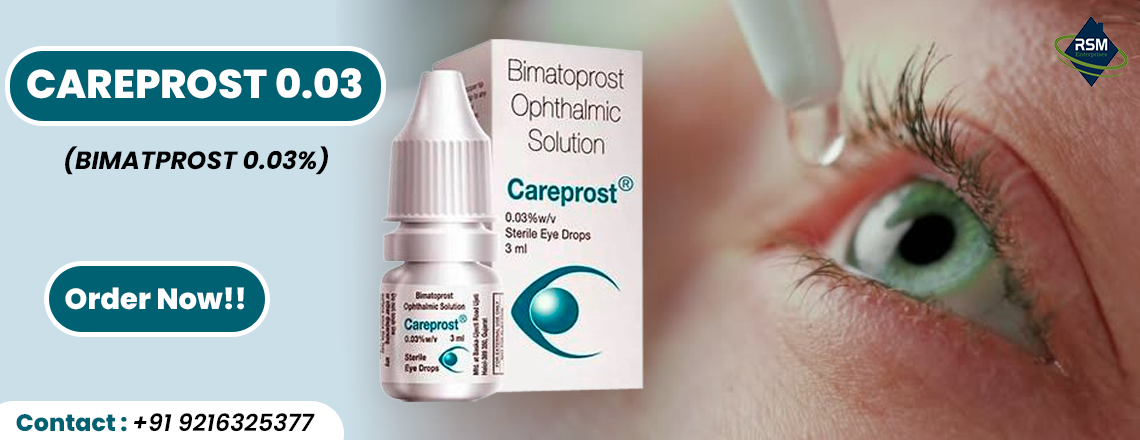Glaucoma is a classification of the eye conditions that cause damage to the optic nerve, which often results in elevated intraocular pressure (IOP). This damage may lead to instantaneous vision loss if immediate treatment is not applied since it impairs the transmission of visual information from the eyes to the brain. More importantly, glaucoma is usually silent in its early stage, so it has another name, "silent thief of sight." As a consequence, routine eye examinations have a paramount role in early diagnosis and protection from this disease. Looking at the range of remedies, there is Careprost 0.03, which stands out as an effective medicine employing the active ingredient Bimatoprost 0.03% to manage the progress of this eye-threatening problem.
What is Careprost 0.03
Careprost 0.03 can be considered a medical option providing treatment for glaucoma development. The Bimatoprost 0.03%, which is the main component of the medicine, can control intraocular pressure. This helps to protect the optic nerve from damage and save vision in the future. This prostaglandin analogue is able to perform its function by the mechanism of selective prostaglandin EP2 receptor antagonism. Increasing the extrusion of the aqueous humour, which is the intraocular fluid, is responsible for the maintenance of intraocular pressure.
Benefits of Careprost 0.03 in Glaucoma Management
- Worth noticing is that the remedy Careprost 0.03 shows evidence that it can lower intraocular pressure, one of the most critical factors in the prevention of progression of the illness, glaucoma.
- Through the management of intraocular pressure, Careprost 0.03 inhibits optic nerve disease and limits vision loss associated with glaucoma.
- Careprost 0.03 is available as an eye solution, offering a convenient way of taking medication, which, in most cases, can be integrated into the patient's daily lifestyle.
- Extensive clinical evidence has shown that Bimatoprost 0.03% is safe and tolerable, meaning both patients and healthcare providers are assured of its reliability in long-term use.
Dosage and Administration
The recommended dosage of Careprost is 0.03, which is equivalent to 0.03% Bimatoprost, and commonly involves the instillation of one drop into the eye(s) affected after that once a day (in most cases at night). It is of paramount importance for patients to stick to the dose regiment assigned by their doctor in order for the medication to be at its most effective. Moving from the suggested dosage may ruin the treatment's effectiveness and lead to a negative result in the end. Consequently, patients should rely on their healthcare provider for a personalized dosing schedule to match their particular disease condition and treatment reaction. Constant intraocular pressure control and strict dosage implementation are crucial for the most efficient way of treating glaucoma, which is by using Careprost 0.03.
Precautions to Consider
- Patients need to be disciplined and follow the prescribed dosage and administration regimen strictly, which will facilitate the therapeutic effects of the remedy and reduce possible adverse effects.
- The only way to consistently evaluate the effectiveness of treatment and make sure that the glaucoma remains under control is through regular monitoring of intraocular pressure.
- Additionally, special attention should be given to pregnant and breastfeeding women, patients with primary ocular problems, and those with a history of hypersensitivity to Bimatoprost or other components of Careprost 0.03.
- For patients who are wearing contact lenses, remove them at least 15 minutes before instilling Careprost 0.03, and wait this time before reinserting them to stop potential interactions.
Conclusion
While Careprost 0.03 may not be an overnight solution in the war against glaucoma, it is undoubtedly a valuable ally in the fight. It combines traits of effectiveness, safety, and convenience, which makes it a favorite tool among practitioners. By employing the therapeutic effect of Bimatoprost 0.03%, this eye medication aims to control IOP and prevent the progression of this sight-threatening complaint. On the other hand, doctors and patients should work together to monitor disease progression effectively, follow the prescribed regimen, and schedule frequent eye tests to achieve optimal treatment results and safeguard the eyes for the future.
 Visit our USFDA APPROVED Spices Division
Visit our USFDA APPROVED Spices Division 

